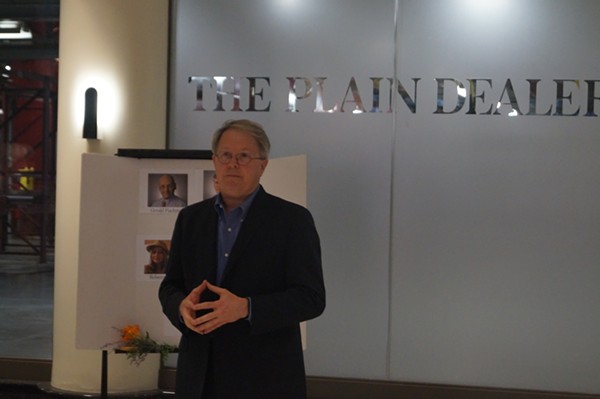
Sam Allard / Scene
Plain Dealer editor George Rodrigue delivers remarks at the community tribute to journalism, (7/5/2018).
Plain Dealer editor George Rodrigue has announced that the paper will lay off nearly half of its unionized workforce in early 2019 as it transitions to a “centralized production hub.”
The announcement came only days after the Plain Dealer News Guild, fighting for its survival, presented a counter proposal to the outsourcing plan that Advance Publications reportedly began to explore in October. Bargaining has been ongoing this month.
Rodrigue sent a letter to local news editors and published it on Cleveland.com Dec. 27 before employees themselves learned that their jobs would soon be gone.
Rodrigue has characterized the decision as an effort to preserve quality local coverage while creating efficiencies. Most of the employees and local observers, however, view the decision as a continuation of Advance’s union-busting efforts, which began with the strategic schism of the print (union, Plain Dealer) and digital (non-union, Cleveland.com) newsrooms.
The PD’s union was the nation’s first news guild (Local 1) and at its height represented more than 700 reporters and editors in the region. The few who remain work under a contract that expires in February, at which point all signs point to the union's final dismantling. In social media posts, the Guild has explicitly characterized the recent decision as "union busting."
The logistics of the move to a centralized production hub remain unclear, but the 29 editors and designers who assemble the paper before it’s printed — selecting stories for the print edition, writing headlines, creating graphics — will ostensibly be “outsourced” to a hub which performs similar functions for a number of papers.
Rodrigue said this centralization concept has been industry tested and proven to be effective, but local journalists have strenuously disputed the notion that an overburdened national staff, working from generic templates, can produce the same level of quality that local editors and designers can. They also question the meaning of “local editorial control,” which Rodrigue insisted the PD would retain.
“Have fun with that local editorial control when you need to make a change and you have to run it past a different, short staffed company that is juggling 15 other papers,” former PD design editor Josh Crutchmer wrote on social media, in a widely shared thread.
every single word of this is designed to confuse and deflect and write around the fact advance is killing the best designed paper in america and taking 30 jobs with it and ultimately will solve nothing https://t.co/zo5PHC552T
— Josh Crutchmer (@jcrutchmer) December 27, 2018
Rodrigue said the paper solicited bids for work from “companies that specialize in centralized production services” but ultimately decided to contract with Advance Local (i.e. the company that owns Cleveland.com and Advance Publications, the Plain Dealer’s corporate parent). It is outsourcing jobs, in other words, to itself. When Scene followed up, Rodrigue said that the Advance "Print Lab" services 19 newspapers and that editing work was conducted at a number of facilities. He said he wasn't sure where the PD would be assembled moving forward, but that specific arrangements would be worked out in the coming weeks.
When Scene aired our suspicion that Advance never intended to take the Guild's counter proposal seriously — that the idea of "soliciting bids" was itself laughable, given the outcome — Rodrigue said that wasn't the case.
"This was a serious business decision, involving much deliberation. My focus was on helping us provide the best possible newspaper for the future, taking into account the forces that are battering our industry. I wish circumstances had not warranted us to consider exploring options and ultimately to make this change, because our Pub Hub staff produces a wonderful newspaper. They’re total professionals, deeply committed to Cleveland. But, given the ongoing challenges print newspapers face, I think we made the best available decision."
Rodrigue’s letter said that current production staff will be invited to apply for new jobs, in Cleveland, editing local content.
The savings this system offers The Plain Dealer will come largely from sharing the cost of editing and designing pages of non-local news, which make up roughly half of our newspaper. In all other ways, The Plain Dealer will remain a local institution. Editorial decision making will remain the responsibility of The Plain Dealer’s editors. Local stories will be selected and copy-edited by veteran journalists based in Cleveland.
We make this decision with some sadness, but with the long-term preservation of The Plain Dealer at heart. This change offers savings where they are least likely to harm the quality of our newspaper. It preserves local editing of local stories. It allows us to focus on the coverage that matters most to our community: in-depth breaking news, investigative journalism, stories that explain issues and events, and coverage that helps people make the most of everything northeast Ohio has to offer. In a world of difficult choices and unavoidable change, this is the option that best serves our readers.
Via PD reporters, after their colleagues received word that their jobs would be lost, they sent messages to the bargaining team, thanking them for their efforts. They then returned to their work, designing and editing the next day’s newspaper.

